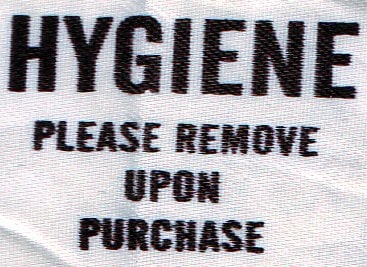Many people don’t wash newly bought clothing before wearing them for the first time. The arguments often made are that our immune systems will protect us from any potential bacterial infection or disease, plus many are afraid that washing clothes will cause them to discolor and stretch out faster.
Unfortunately, the rise of fast fashion (low quality cheap clothes that are designed to be worn once or twice and then discarded entirely, without need to wash it ever) has caused many people to get into the mindset that they do not need to wash their clothes before wearing them. This logic has even been extended to swimsuits, which will be the focus of this article.
Since bathing suits are considered intimates as well, they will often come with a hygiene liner over the groin area that you can remove after purchase. This liner gives people a false sense of security, thinking that the bacteria was only on the liner and that removal of it means the swimsuit bottom is now “clean.” That couldn’t be further from the truth.
You should always wash your swimsuits before wearing it because you have no clue what it has gone through before you bought it. The presence of a hygiene liner is not a guarantee of cleanliness; it could have easily been removed and stuck back on. Plus, a lot of clothes are made in foreign countries, in bacteria-ridden factories, made with dirty machines that can spread foreign bacteria. There is also a risk that people with STDs have tried on the swimsuit. Do you really want to risk exposing your body to these risks by not washing your swimsuit before wearing it?
In this article, we will go over why it’s a great idea to wash your swimsuits before wearing them for the first time. We will also provide tips on how you can safely try on a bathing suit while minimizing risk of getting a nasty venereal disease.
Why you should wash bathing suits before wearing them
Hygiene

Would you be willing to eat someone’s leftovers? Would you share a toothbrush, even if it’s with a family member? Would you rub your genitals on a piece of fabric that multiple people have rubbed their genitals on? Do all of these scenarios gross you out equally, or does one of them gross you out a lot less, if at all?
It seems like the final scenario that I laid out with regards to rubbing one’s genitals on a piece of fabric other genitals have touched seems to gross people out the least, and this is what happens when you wear an unwashed swimsuit.
My hypothesis as to why this is the case is because the first two scenarios have to do with putting something foreign into one’s mouth, and I understand people care a lot more about hygiene if something is going near their face. But, the third scenario is not automatically better just because it’s down there instead of by your face.
You don’t need a researcher to tell you that you’re going to find a lot of nasty stuff on a swimsuit bottom. In case you’re curious, to no one’s surprise, they found skin, fecal matter, respiratory tract bacteria, and vaginal organisms like yeast. For these reasons, it’s not a good idea to share bathing suits either unless you absolutely trust that person.
Have you ever walked by normal people in public and caught a whiff of how bad they smell? Or maybe you’ve seen someone that is just visibility dirty walking around blissfully unaware of how unhygienic they are. Even a lot of regular folks will admit they have unusual habits like not thoroughly washing their butt in the shower because they think the running water is sufficient to clean their most dirty areas, or that they rarely shower at all.
These are the kinds of people that have already tried on the swimsuit you just bought. Who knows how many of them don’t shower properly, don’t wipe properly, and don’t really care about hygiene. While you can’t predict how dirty your swimsuit is at the time of purchase, you can definitely control how clean it is before you first wear it by washing it first.
Avoid STDs
If you thought fecal matter was the worst thing you could expect, think again. You could potentially get an STD from wearing a swimsuit bottom that an infected individual wore.
The most common STDs you could get are Trichomoniasis (“trich”), public lice, and Molluscum Contagiosum, bacterial vaginosis, and urinary tract infections from E.Coli. Some of the more severe and less likely to be transferred STDs are Hepatitis A, B, and C, and even HIV. Learn more about these STDs – what their symptoms are and how easily transferable they are by going here and here.
Generally speaking, the chances of getting an STD from trying on a bathing suit is low, but it’s not zero. Even the hygienic liner does not do anything because you are not provided with a fresh liner each time and many women remove the liner so that they can get an accurate feel of how it feels without the liner. Whether that liner was removed or not doesn’t matter; you should still wash your swimsuits prior to wearing them not just for cleanliness’ sake, but to avoid the spread of disease.
You don’t know what it has come into contact with

Long before a bathing suit even finds its way onto a woman’s body, it will likely have come into contact with a lot of bacteria. You don’t know where the swimsuit was sourced, and the conditions of where it was sourced from.
Chances are high that it was made in a foreign country, most likely from a sweatshop in China or somewhere in Southeast Asia. The conditions at these factories are questionable, and they definitely are not held to the same standards as the West. Thus, even at the source, a bathing suit will come into contact with numerous hands and machines that are probably not clean.
It will eventually get shipped over to the West, where more employees will touch it before it even makes it onto the rack. Then people will finally get to try it on, and eventually, it will be your turn.
But before it reaches you, who knows how many times it has come into contact with someone with questionable hygiene and people with foreign bacteria? Was it dirty because so many people tried it on, or was it dirty to start with?
Note: I am not saying that Asians are unclean, but that their sweatshops definitely do not compare to the same standards of factories in the West, and that foreign bacteria may be more potent because our immune systems have not encountered them before.
Do not be so naive as to assume that everyone follows the best practices when it comes to hygiene, from worker to employee to shopper; just wash your swimsuit before you wear it.
How to protect yourself
Since we cannot be sure that the swimsuit is clean even with the hygienic liner on (since it can be easily taken off and put back), what you absolutely must NOT do is take off your underwear and expose your bare genitals to the bathing suit.
Said another way, ALWAYS keep your underwear on when trying on a swimsuit. Doesn’t matter if you’re a guy, girl, non-binary, black, white, or Asian. I don’t care who you are or what you identify as, just keep your undies on.
The tiny strip of fabric provided by your undies is the only thing protecting your genitals from directly coming into contact with a whole bunch of nasties, and it essentially will serve as the true hygienic liner.
There is a stigma that somehow used bathing suits are even dirtier than new store-bought ones, but knowing what you know now, you ought to realize that’s not necessarily true. Just because a swimsuit hasn’t been returned doesn’t mean it is free of bacteria or germs, and you should keep your underwear on when trying them on.
Once you’re back home, I suggest thoroughly cleaning the underwear that you wore to the changing room, particularly the groin area, to ensure that any bacteria and germs that it came into contact with has washed off and does not spread to the other clothes in your laundry basket.
And, obviously, you should wash the swimsuit before you wear it for the first time without underwear. And you should be washing it every time after you’re done swimming too. For the sake of hygiene and protecting your swimsuit from the harmful effects of chlorine, wash your swimsuit often, especially if you are trying it on for the first time.


